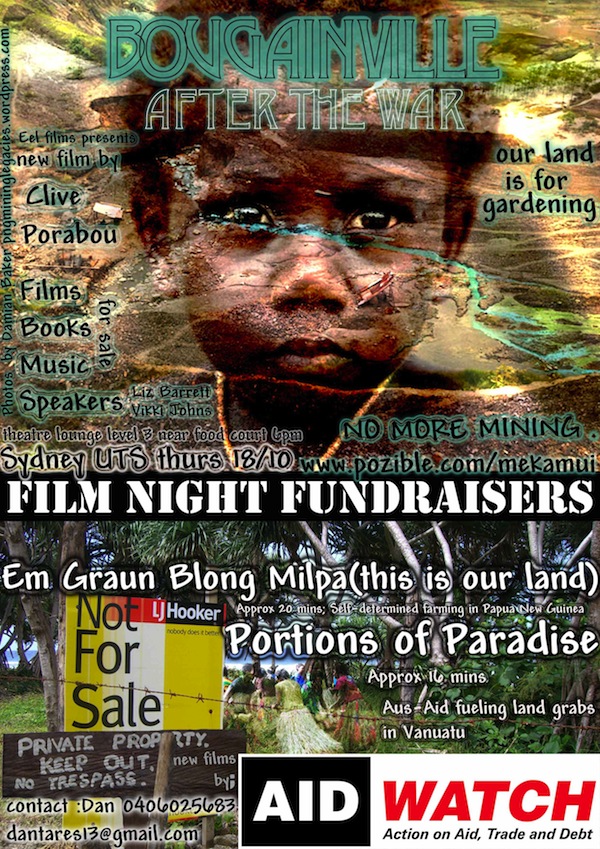Film Night 18th October Uni of Sydney
Hello everyone! You are invited to a night of documentaries focused on the messages of Melanesian people regarding their  land.
land.
Sydney UTS main building foyer > food court/bar Level 3 the Theatre Lounge 6pm Thursday 18th October 2012.
We will be showing; Bougainville after the war 2012 by Eel productions Clive Porabou. 21min. Interviews with people looking at their lives now, the opportunity and position they are in after the crisis and the return of a Bougainville man home after twenty years in Australia. Incite into the self determination of the lives of people in village provinces throughout their land and the direction people see in the future. Unfortunately Clive on this occasion is not here in Australia to present his new production however he has given permission for the screenings to sell his films and for fundraising toward Eel productions studio on the ground. www.pozible.com/mekamui There will be a discussion with Vikki John and Daniel Jones on ways Australians can contribute to the requests of the people and ensure their interests remain protected.
The second half of the night 7pm will be a discussion from Liz Barrett presenting and discussing a new AIDWATCH production about Melanesian Customary Land, Portions of Paradise. About AusAid supported land reform program is fueling a land grab by Australian owned real estate companies based in Vanuatu. While reforms may be seen as a path to economic development, the Ni-Vanuatu are being robbed of their traditional rights to fish, hunt and live on what was once their ancestral land.(http://www.youtube.com/watch?v=0OMBrtZXEGk) Approx 16 mins running time
Followed by a great Film that MPI showed in remote villages when we visited the Watut River in April 2010 Em Graun Blong Milpa (this is our land) In 1998, the people of Saussi in the in the Ramu Valley Madang Province (Papua New Guinea) got word of plans that a sugar & oil palm company, Ramu Agri-Industries, was seeking to expand its oil palm plantations into customary land owned by the Saussi. Armed with information about the negative impacts of oil palm in other provinces and other countries, the Saussi stood firm and told the company and the Papua New Guinea Government that they were not going to allow oil palm on their land. Instead of oil palm, they chose to remain in control of the land and all their resources and make their own money by selling cocoa, watermelons, peanuts and fish. (http://www.youtube.com/watch?v=4Qk9X_rOOjI&feature=g-all-u) Approx 20 mins
Hosted by AIDWATCH